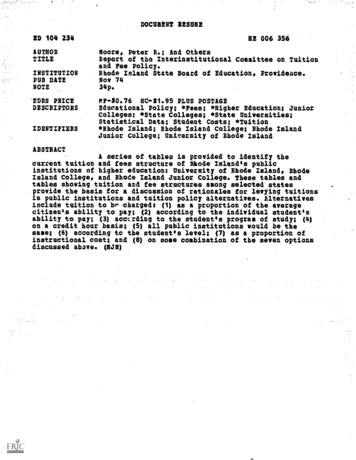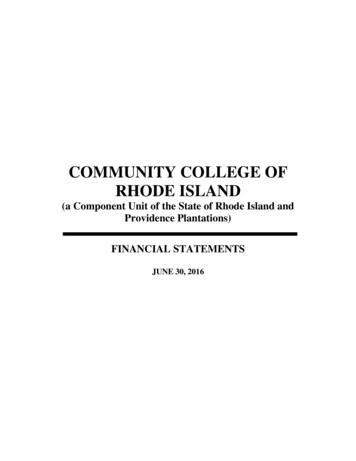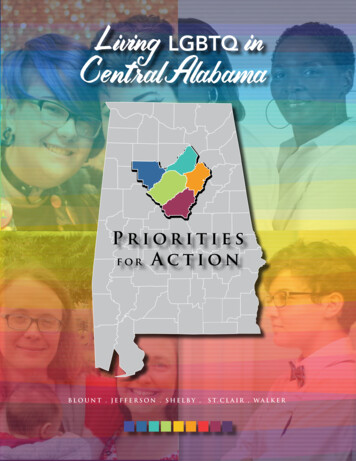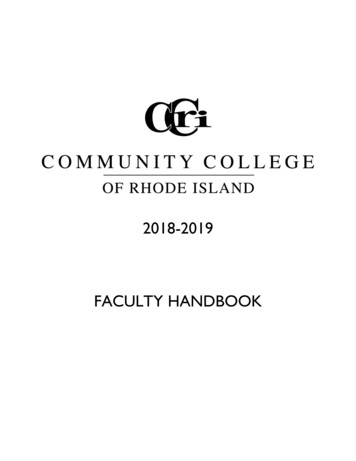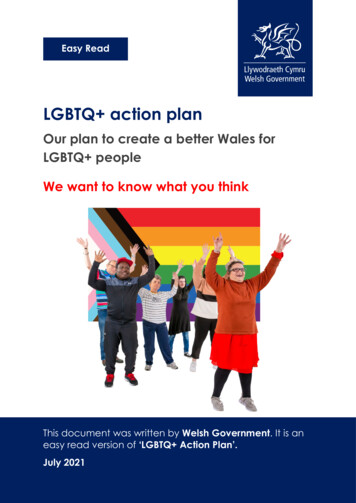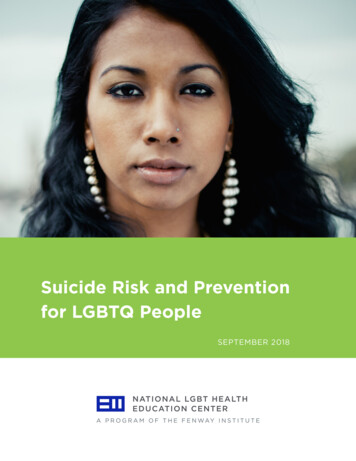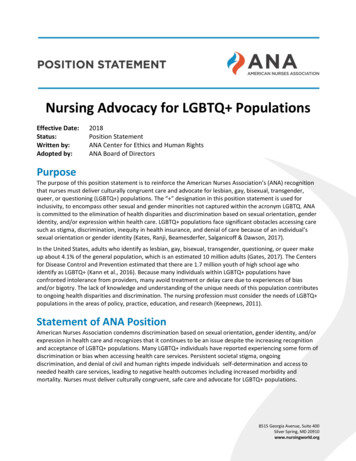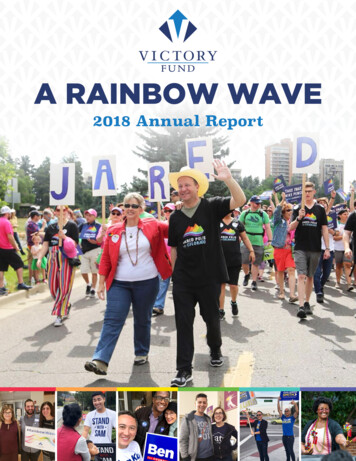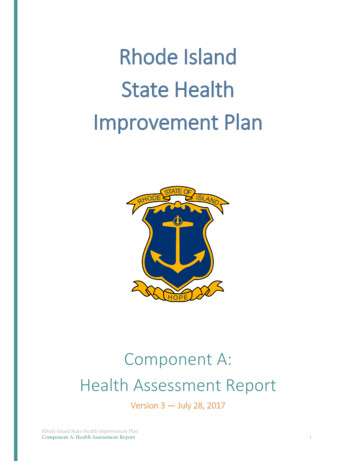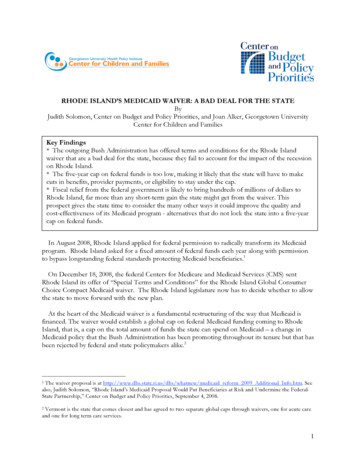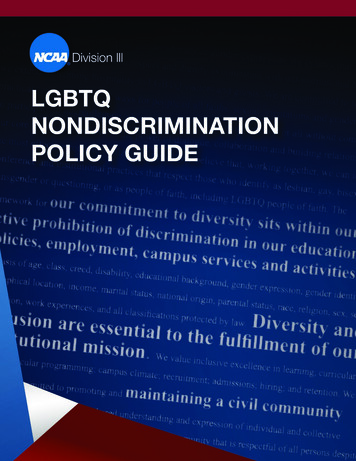
Transcription
LGBTQNONDISCRIMINATIONPOLICY GUIDE
NCAA DIVISION III LGBTQ NONDISCRIMINATION POLICY GUIDEb
NCAA DIVISION III LGBTQ NONDISCRIMINATION POLICY GUIDEIntroductionAs part of the NCAA’s commitment to foster athletics programs in which everyone is safe, welcomedand respected, the Division III Lesbian, Gay, Bisexual, Transgender and Questioning (LGBTQ) WorkingGroup is pleased to provide an LGBTQ Nondiscrimination Policy Guide to help member institutions andconferences establish welcoming environments on their campuses. As a core value, the NCAA believes inand is committed to an inclusive culture that fosters equitable participation for student-athletes and careeropportunities for coaches and administrators from diverse backgrounds.In 2016, the Division III Management and Presidents Councils endorsed establishing a Division III LGBTQWorking Group — the first of its kind in the NCAA. While respecting the unique missions of our institutions, theworking group aims to ensure Division III is safe for, inclusive of and welcoming to the LGBTQ community andits allies. To that end, the working group has focused on increasing engagement, education and understandingof LGBTQ issues at all levels of Division III by examining current resources and areas of need, and creatingprogrammatic, resource and recognition opportunities for everyone.Research shows that diversity and inclusion improve the learning environment and enhance the likelihoodof an organization’s success. The LGBTQ Working Group’s mission is to support the Division III educationalenvironment by promoting efforts from Division III institutions and conferences to be more inclusive of allLGBTQ student-athletes, coaches, administrators, fans and their advocates within the parameters of theirinstitutional and conference missions.To assist in this regard, the working group in the fall of 2017 surveyed Division III members from fourdemographic groups: presidents and athletics direct reports (80 responses); athletics administrators andcoaches (1,384 responses); commissioners and assistant commissioners (44 responses); and student-athletes(3,033 responses) to better understand the current landscape and climate surrounding LGBTQ issues onDivision III campuses and within conferences. The survey focused on four areas: landscape and culture;education and resources; visibility and recognition; and policies.Some of the findings pertaining to athletics LGBTQ nondiscrimination policies are listed below. The feedbackled the working group to prioritize developing LGBTQ-inclusive policy template language that may be used inathletics department, student-athlete and conference office handbooks. Sixty (60) percent of athletics administrators and coaches reported their institution has a written LGBTQ nondiscrimination policy, while only 38 percent indicated their athletics department has such a policy. Seventy-five(75) percent noted policies explicitly included sexual orientation, gender identity and gender expression. Fewer than 50 percent of survey respondents indicated their athletics department and their student- athletehandbooks included supporting and promoting an inclusive, respectful environment for the LGBTQ community.1
NCAA DIVISION III LGBTQ NONDISCRIMINATION POLICY GUIDE Fewer than 20 percent of commissioners and assistant commissioners reported their conference has awritten LGBTQ nondiscrimination policy. Forty-four (44) percent of commissioners and assistant commissioners said their conference has a transgender student-athlete participation policy.During the Division III Business Session at the 2018 NCAA Convention, the working group solicited additionalinformation via polling questions (one response per institution and conference office). Eighty-five (85) percentof respondents noted that if made available, they would use template language to develop LGBTQ-inclusivepolicy statements and nondiscrimination clauses for their handbooks.The working group collected and reviewed sample LGBTQ-inclusive policies from several Division IIIinstitutions and conferences with the ultimate goal of creating an LGBTQ-inclusive policy template for DivisionIII institutions and conferences to use in athletics department, student-athlete and conference handbooks.The template language is broad in concept but succinct in content. It accounts for the diversity of institutiontypes (e.g., public, private faith-based and private secular) in Division III. The policy guide allows institutionsand conferences to include web links to their own policies to ensure institutional and conference autonomy.It also directs institutions and conferences to consult with their campus leadership, including generalcounsels, before adoption to ensure all athletics-specific LGBTQ-inclusive policies align with institutional andconference missions and comply with policies that apply to general student bodies and/or personnel.The Division III LGBTQ Working Group invites you to use the following sample policy templates, guidingquestions and additional resources as you consider developing an LGBTQ-inclusive nondiscrimination policyon your campus and in your conference.Sincerely,The Division III LGBTQ Working GroupMikayla Costello, Student-Athlete Advisory Committee Representative, Willamette University.Brit Katz, Vice President and Dean of Student Life, Millsaps College.Chris Kimball, President, California Lutheran University.Kyrstin Krist, Faculty Athletics Representative, Methodist University.Crystal Lanning, Director of Athletics, University of Wisconsin-River Falls.Donna Ledwin, Commissioner, Allegheny Mountain Collegiate Conference.Emet Marwell, Student Representative, Mount Holyoke College.Kathleen Murray, President, Whitman College.Julie Shaw, Director of Education, Women’s Sports Foundation.Mike Vienna, Director of Athletics, Emory University.Neil Virtue, Assistant Director of Athletics/Head Swimming Coach, Mills College.2
NCAA DIVISION III LGBTQ NONDISCRIMINATION POLICY GUIDEHandbookTemplateLanguageThe NCAA Division III Management and Presidents Councils endorse developing athletics-specific policiesthat ensure the safety and respect of all student-athletes, coaches and administrators, including those whoare lesbian, gay, bisexual, transgender and questioning (LGBTQ).Athletics participation provides a unique identity for our student-athletes, and athletics departments havea leadership opportunity to create LGBTQ nondiscrimination policies that complement their institutions’nondiscrimination policies and ensure an athletics environment that is welcoming and safe. When students,coaches and administrators can express their orientations and identities without fear of repercussion orretaliation, they are able to more fully focus on their educational objectives and their athletics participation.Accordingly, the Division III Lesbian, Gay, Bisexual, Transgender and Questioning (LGBTQ) WorkingGroup offers the following sample language that institutions and conference offices may choose toadopt or incorporate into their own LGBTQ nondiscrimination policies. These samples are the result ofa comprehensive review of existing policies at Division III institutions and conferences and may act as afoundation for your own LGBTQ nondiscrimination policy.Specific recommendations include, but are not limited to, the following: Collaborate with campus and conference leadership, including general counsels, to ensure policiesare consistent and congruent with institutional and conference mission and policies. Incorporate inclusive policies in handbooks, websites, participation forms, announcements and meetings. Enforce inclusive policies. Develop fair and consistent enforcement (consequences) for incidents related tothe inclusive nondiscrimination policies. Prohibit anti-LGBTQ behavior and language at athletics events. Offer options to note sexual identity, gender identity and gender expression on student-athleteparticipation forms.3
NCAA DIVISION III LGBTQ NONDISCRIMINATION POLICY GUIDESampleNondiscriminationStatementsSAMPLE 1[Institution/Conference X] athletics is committed to safety, fairness and respect for all participants. Collegiateathletics provides an opportunity for students to compete with and against others who come from a varietyof backgrounds, but all of whom share the common goal of achieving athletics excellence. Valuing thiscommon ground enhances the social and competitive experience for all and is important to team successand to individual development. Teams that value each member’s contribution to the unit, while respectingindividual differences, provide a healthy foundation for the team and each member of the team to focus onachieving their athletics and educational goals.We have an obligation to provide equal opportunity for our student-athletes and staff. All those involved inathletics shall be aware of these obligations and treat them as core values. Discrimination toward lesbian,gay, bisexual, transgender and questioning people (actual or perceived) negatively affects all who participatein athletics competition. If discrimination is accepted as part of the common practice of an athleticsdepartment, it undermines the core principle of equal opportunity.SAMPLE 2Diversity and inclusion are essential to the fulfillment of our [institutional/conference] mission. We valueinclusive excellence in learning, curricular and co-curricular programming; campus climate; recruitment;admissions; hiring; and retention. We are deeply committed to promoting and maintaining a civil communitythat facilitates opportunities for shared understanding and expression of individual and collective truths.Moreover, we resolve to create and uphold a community that is respectful of all persons despite differencesin age, class, creed, disability, educational background, gender expression, gender identity, geographicallocation, income, marital status, national origin, parental status, race, religion, sex, sexual orientation, workexperiences and other dimensions of diversity.4
NCAA DIVISION III LGBTQ NONDISCRIMINATION POLICY GUIDESAMPLE 3[Institution/Conference X] is committed to its diversity and inclusion of its student-athletes, athleticsadministrators and staff, which is a point of pride and a hallmark of the institution. The framework for ourcommitment to diversity sits within our active prohibition of discrimination in our educational policies,employment, campus services and activities on the basis of age, class, creed, disability, educationalbackground, gender expression, gender identity, geographical location, income, marital status, national origin,parental status, race, religion, sex, sexual orientation, work experiences, and all classifications protected by law.SAMPLE 4[Institution/Conference X] is committed to safety, fairness and respect for all participants. Collegiateathletics provides an opportunity for students to compete with and against others who come from a varietyof backgrounds, but all of whom share the common goal of achieving athletics excellence. Valuing thiscommon ground enhances the educational, social and competitive experience for all and is important to teamsuccess and to individual development. We believe that our intercollegiate athletics program/conference hasa responsibility to promote the well-being of all students regardless of sexual orientation, gender identityor gender expression. We believe that all students should be safe and treated with respect and dignity asconsistent with our institutional/conference values and mission. Moreover, we extend welcoming hospitality toLGBTQ visitors and guests. We are committed to identifying practical “common ground” ways for people of allfaiths, sexual orientations and gender identities to participate in intercollegiate athletics programs that modelrespect for all without compromising our core values. We believe in the power of dialogue, collaboration andbuilding relationships as the most effective route to realizing our goal. We believe that, working together, wecan identify conference and institutional practices that respect those who identify as lesbian, gay, bisexual,transgender or questioning, or as people of faith, including LGBTQ people of faith.5
NCAA DIVISION III LGBTQ NONDISCRIMINATION POLICY GUIDEQuestionsto ConsiderThe following questions are designed to help Division III institutions and conferences establish LGBTQinclusive athletics programs. By answering these questions, institutions and conferences can evaluatewhether they have the policies, resources and infrastructure necessary to be LGBTQ-inclusive. Yourinstitution or conference is encouraged to convene a review panel of campus, athletics department andconference office personnel to review the questions and determine the most appropriate next steps foryour institution or conference.1.2.2.3.4.4.5.6.6How do we incorporate the use of inclusive language? In written documents and in generalspoken language, it is best to use gender-neutral language. In personal interactions, the bestalternative is to ask the person what pronouns they use or use the person’s proper name.Can we change our student-athlete participation forms to include the LGBTQ community(e.g., offer an option for student-athletes to indicate non-binary gender identities)?Do our facilities have gender-inclusive, single-occupancy changing rooms and restrooms thatcould be available to all student-athletes, fans and staff?How do we report incidents of nondiscrimination policy infractions? (Consider reviewing andincorporating campus reporting procedures.)Have we evaluated and/or created department policies that consider how to navigaterelationships on a team or within a department?What are our policies for away trips (e.g., rooming assignments, accommodations andcommunication plan with our opponent’s institution)?
NCAA DIVISION III LGBTQ NONDISCRIMINATION POLICY GUIDE7.8.How does our institution include transgender/gender-fluid/gender non-conformingstudent-athletes before, during and after transitioning socially and/or medically?How does our department refer to transgender/gender-fluid/gender non-conformingstudent-athletes in written, spoken or video media outlets? What systems are in place forstudent-athletes to indicate how they want to be represented (e.g., sports information forms)?What policies apply if someone’s gender identity or expression changes mid-season?9.10.10.Are there policies related to team uniforms/dress codes that may inadvertently discriminate ormarginalize?How do we create environments that enhance communication and relationship-building?Do our policies and practices encourage seeking common ground, mutual respect and civility?Because LGBTQ-inclusive efforts are evolving, we recommend reviewing and updating yourLGBTQ nondiscrimination policies annually, if not more frequently.7
NCAA DIVISION III LGBTQ NONDISCRIMINATION POLICY GUIDEAdditionalResourcesNCAA Champions of Respect: Inclusion of LGBTQ Student-Athletes and Staff in NCAA CRLGBTQ.pdfNCAA Five Ways to Have an LGBTQ-Inclusive Athletics Departmentwww.ncaa.org/sites/default/files/2017INC 5WaystoHaveanLGBTQ-InclusiveAthleticsDepartment 20170316.pdfNCAA Inclusion of Transgender ransgender Handbook 2011 Final.pdfNCAA Mind, Body and Sport: Harassment and Discrimination – LGBTQ onlgbtq-student-athletesNCAA LGBTQ Organizational Organizational%2BResources.pdfNCAA Division III LGBTQ Terminology and IIDivInc LGBTQTerminologyandDefinitionResource 20180123.pdf8
NCAA DIVISION III LGBTQ NONDISCRIMINATION POLICY GUIDE9
NCAA is a trademark of the National Collegiate Athletic Association.August 2018
2 NC DIVISIN III LGBTQ NNDISCIMINTIN LIC GIDE Fewer than 20 percent of commissioners and assistant commissioners reported their conference has a written LGBTQ nondiscrimination policy. Forty-four (44) percent of commissioners and assistant commissioners said their conference has a trans- gender student-athlete participation policy. During the Division III Business Session at the 2018 NCAA .
